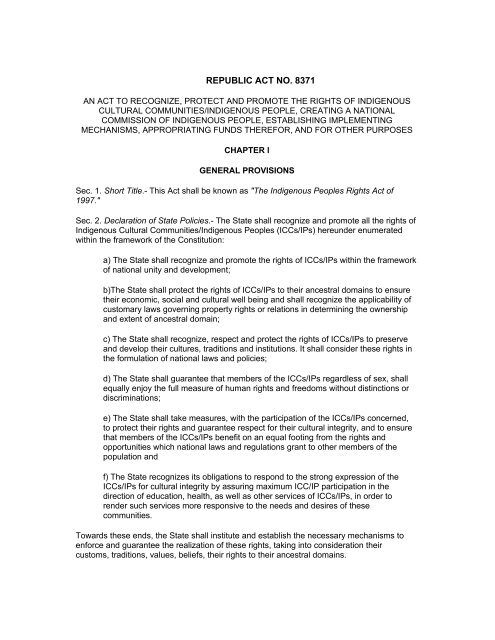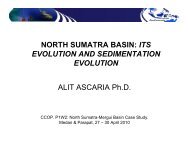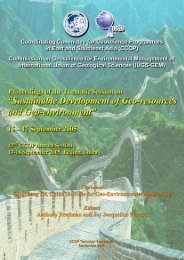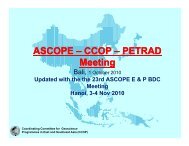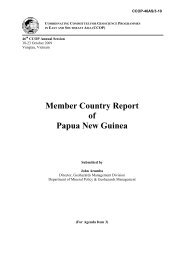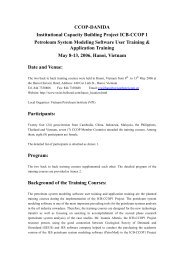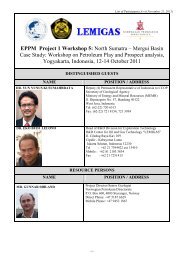REPUBLIC ACT NO. 8371 - CCOP
REPUBLIC ACT NO. 8371 - CCOP
REPUBLIC ACT NO. 8371 - CCOP
You also want an ePaper? Increase the reach of your titles
YUMPU automatically turns print PDFs into web optimized ePapers that Google loves.
<strong>REPUBLIC</strong> <strong>ACT</strong> <strong>NO</strong>. <strong>8371</strong><br />
AN <strong>ACT</strong> TO RECOGNIZE, PROTECT AND PROMOTE THE RIGHTS OF INDIGE<strong>NO</strong>US<br />
CULTURAL COMMUNITIES/INDIGE<strong>NO</strong>US PEOPLE, CREATING A NATIONAL<br />
COMMISSION OF INDIGE<strong>NO</strong>US PEOPLE, ESTABLISHING IMPLEMENTING<br />
MECHANISMS, APPROPRIATING FUNDS THEREFOR, AND FOR OTHER PURPOSES<br />
CHAPTER l<br />
GENERAL PROVISIONS<br />
Sec. 1. Short Title.- This Act shall be known as "The Indigenous Peoples Rights Act of<br />
1997."<br />
Sec. 2. Declaration of State Policies.- The State shall recognize and promote all the rights of<br />
Indigenous Cultural Communities/Indigenous Peoples (ICCs/IPs) hereunder enumerated<br />
within the framework of the Constitution:<br />
a) The State shall recognize and promote the rights of ICCs/IPs within the framework<br />
of national unity and development;<br />
b)The State shall protect the rights of ICCs/IPs to their ancestral domains to ensure<br />
their economic, social and cultural well being and shall recognize the applicability of<br />
customary laws governing property rights or relations in determining the ownership<br />
and extent of ancestral domain;<br />
c) The State shall recognize, respect and protect the rights of ICCs/IPs to preserve<br />
and develop their cultures, traditions and institutions. It shall consider these rights in<br />
the formulation of national laws and policies;<br />
d) The State shall guarantee that members of the ICCs/IPs regardless of sex, shall<br />
equally enjoy the full measure of human rights and freedoms without distinctions or<br />
discriminations;<br />
e) The State shall take measures, with the participation of the ICCs/IPs concerned,<br />
to protect their rights and guarantee respect for their cultural integrity, and to ensure<br />
that members of the ICCs/IPs benefit on an equal footing from the rights and<br />
opportunities which national laws and regulations grant to other members of the<br />
population and<br />
f) The State recognizes its obligations to respond to the strong expression of the<br />
ICCs/IPs for cultural integrity by assuring maximum ICC/IP participation in the<br />
direction of education, health, as well as other services of ICCs/IPs, in order to<br />
render such services more responsive to the needs and desires of these<br />
communities.<br />
Towards these ends, the State shall institute and establish the necessary mechanisms to<br />
enforce and guarantee the realization of these rights, taking into consideration their<br />
customs, traditions, values, beliefs, their rights to their ancestral domains.
CHAPTER ll<br />
DEFINITION OF TERMS<br />
Sec. 3. Definition of Terms.- For purposes of this Act, the following terms shall mean:<br />
a) Ancestral Domains - Subject to Section 56 hereof, refer to all areas generally<br />
belonging to ICCs/IPs comprising lands,inland waters, coastal areas, and natural<br />
resources therein, held under a claim of ownership, occupied or possessed by<br />
ICCs/IPs, themselves or through their ancestors, communally or individually since<br />
time immemorial, continuously to the present except when interrupted by war, force<br />
majeure or displacement by force, deceit, stealth or as a consequence of<br />
government projects or any other voluntary dealings entered into by government and<br />
private individuals, corporations, and which are necessary to ensure their economic,<br />
social and cultural welfare. It shall include ancestral land, forests, pasture,<br />
residential, agricultural, and other lands individually owned whether alienable and<br />
disposable or otherwise, hunting grounds, burial grounds, worship areas, bodies of<br />
water, mineral and other natural resources, and lands which may no longer be<br />
exclusively occupied by ICCs/IPs but from which their traditionally had access to for<br />
their subsistence and traditional activities, particularly the home ranges of ICCs/IPs<br />
who are still nomadic and/or shifting cultivators;<br />
b) Ancestral Lands - Subject to Section 56 hereof, refers to land occupied,<br />
possessed and utilized by individuals, families and clans who are members of the<br />
ICCs/IPs since time immemorial, by themselves or through their predecessors-ininterest,<br />
under claims of individual or traditional group ownership,continuously, to the<br />
present except when interrupted by war, force majeure or displacement by force,<br />
deceit, stealth, or as a consequence of government projects and other voluntary<br />
dealings entered into by government and private individuals/corporations, including,<br />
but not limited to, residential lots, rice terraces or paddies, private forests, swidden<br />
farms and tree lots;<br />
c) Certificate of Ancestral Domain Title - refers to a title formally recognizing the<br />
rights of possession and ownership of ICCs/IPs over their ancestral domains<br />
identified and delineated in accordance with this law;<br />
d) Certificate of Ancestral Lands Title - refers to a title formally recognizing the rights<br />
of ICCs/IPs over their ancestral lands;<br />
e) Communal Claims - refer to claims on land, resources and rights thereon,<br />
belonging to the whole community within a defined territory<br />
f) Customary Laws - refer to a body of written and/or unwritten rules, usages,<br />
customs and practices traditionally and continually recognized, accepted and<br />
observed by respective ICCs/IPs;<br />
g) Free and Prior Informed Consent - as used in this Act shall mean the consensus<br />
of all members of the ICCs/IPs to; be determined in accordance with their respective<br />
customary laws and practices, free from any external manipulation, interference and<br />
coercion, and obtained after fully disclosing the intent and scope of the activity, in a<br />
language an process understandable to the community;<br />
h) Indigenous Cultural Communities/Indigenous Peoples - refer to a group of people<br />
or homogenous societies identified by self-ascription and ascription by other, who
have continuously lived as organized community on communally bounded and<br />
defined territory, and who have, under claims of ownership since time immemorial,<br />
occupied, possessed customs, tradition and other distinctive cultural traits, or who<br />
have, through resistance to political, social and cultural inroads of colonization, nonindigenous<br />
religions and culture, became historically differentiated from the majority<br />
of Filipinos. ICCs/IPs shall likewise include peoples who are regarded as indigenous<br />
on account of their descent from the populations which inhabited the country, at the<br />
time of conquest or colonization, or at the time of inroads of non-indigenous religions<br />
and cultures, or the establishment of present state boundaries, who retain some or<br />
all of their own social, economic, cultural and political institutions, but who may have<br />
been displaced from their traditional domains or who may have resettled outside their<br />
ancestral domains;<br />
i) Indigenous Political Structure - refer to organizational and cultural leadership<br />
systems, institutions, relationships, patterns and processed for decision-making and<br />
participation, identified by ICCs/IPs such as, but not limited to, Council of Elders,<br />
Council of Timuays, Bodong Holder, or any other tribunal or body of similar nature;<br />
j) Individual Claims - refer to claims on land and rights thereon which have been<br />
devolved to individuals, families and clans including, but not limited to, residential<br />
lots, rice terraces or paddies and tree lots;<br />
k) National Commission on Indigenous Peoples (NCIP) - refers to the office created<br />
under this Act, which shall be under the Office of the President, and which shall be<br />
the primary government agency responsible for the formulation and implementation<br />
of policies, plans and programs to recognize, protect and promote the rights of<br />
ICCs/IPs;<br />
l) Native Title - refers to pre-conquest rights to lands and domains which, as far back<br />
as memory reaches, have been held under a claim of private ownership by ICCs/IPs,<br />
have never been public lands and are thus indisputably presumed to have been held<br />
that way since before the Spanish Conquest;<br />
m) Nongovernment Organization - refers to a private, nonprofit voluntary<br />
organization that has been organized primarily for the delivery of various services to<br />
the ICCs/IPs and has an established track record for effectiveness and acceptability<br />
in the community where it serves;<br />
n) People's Organization - refers to a private, nonprofit voluntary organization of<br />
members of an ICC/IP which is accepted as representative of such ICCs/IPs;<br />
o) Sustainable Traditional Resource Rights - refer to the rights of ICCs/IPs to<br />
sustainably use,manage, protect and conserve a) land, air, water, and minerals; b)<br />
plants, animals and other organisms; c) collecting, fishing and hunting grounds; d)<br />
sacred sites; and e) other areas of economic, ceremonial and aesthetic value in<br />
accordance with their indigenous knowledge, beliefs, systems and practices; and<br />
p) Time Immemorial - refers to a period of time when as far back as memory can go,<br />
certain ICCs/IPs are known to have occupied, possessed in the concept of owner,<br />
and utilized a defined territory devolved to them, by operation of customary law or<br />
inherited from their ancestors, in accordance with their customs and traditions.
CHAPTER III<br />
RIGHTS TO ANCESTRAL DOMAINS<br />
Sec. 4. Concept of Ancestral Lands/Domains.- Ancestral lands/domains shall include such<br />
concepts of territories which cover not only the physical environment but the total<br />
environment including the spiritual and cultural bonds to the area which the ICCs/IPs<br />
possess, occupy and use and to which they have claims of ownership.<br />
Sec. 5. Indigenous Concept of Ownership.- Indigenous concept of ownership sustains the<br />
view that ancestral domains and all resources found therein shall serve as the material<br />
bases of their cultural integrity. The indigenous concept of ownership generally holds that<br />
ancestral domains are the ICC's/IP's private but community property which belongs to all<br />
generations and therefore cannot be sold, disposed or destroyed. It likewise covers<br />
sustainable traditional resource rights.<br />
Sec. 6. Composition of Ancestral Lands/Domains.- Ancestral lands and domains shall<br />
consist of all areas generally belonging to ICCs/IPs as referred under Sec. 3, items (a) and<br />
(b) of this Act.<br />
Sec. 7. Rights to Ancestral Domains.- The rights of ownership and possession of ICCs/IPs t<br />
their ancestral domains shall be recognized and protected. Such rights shall include:<br />
a. Rights of Ownership.- The right to claim ownership over lands, bodies of water<br />
traditionally and actually occupied by ICCs/IPs, sacred places, traditional hunting and<br />
fishing grounds, and all improvements made by them at any time within the domains;<br />
b. Right to Develop Lands and Natural Resources.- Subject to Section 56 hereof,<br />
right to develop, control and use lands and territories traditionally occupied, owned,<br />
or used; to manage and conserve natural resources within the territories and uphold<br />
the responsibilities for future generations; to benefit and share the profits from<br />
allocation and utilization of the natural resources found therein; the right to negotiate<br />
the terms and conditions for the exploration of natural resources in the areas for the<br />
purpose of ensuring ecological, environmental protection and the conservation<br />
measures, pursuant to national and customary laws; the right to an informed and<br />
intelligent participation in the formulation and implementation of any project,<br />
government or private, that will affect or impact upon the ancestral domains and to<br />
receive just and fair compensation for any damages which they sustain as a result of<br />
the project; and the right to effective measures by the government to prevent any<br />
interfere with, alienation and encroachment upon these rights;<br />
c. Right to Stay in the Territories- The right to stay in the territory and not be removed<br />
therefrom. No ICCs/IPs will be relocated without their free and prior informed<br />
consent, nor through any means other than eminent domain. Where relocation is<br />
considered necessary as an exceptional measure, such relocation shall take place<br />
only with the free and prior informed consent of the ICCs/IPs concerned and<br />
whenever possible, they shall be guaranteed the right to return to their ancestral<br />
domains, as soon as the grounds for relocation cease to exist. When such return is<br />
not possible, as determined by agreement or through appropriate procedures,<br />
ICCs/IPs shall be provided in all possible cases with lands of quality and legal status<br />
at least equal to that of the land previously occupied by them, suitable to provide for<br />
their present needs and future development. Persons thus relocated shall likewise be<br />
fully compensated for any resulting loss or injury;
d. Right in Case of Displacement.- In case displacement occurs as a result of natural<br />
catastrophes, the State shall endeavor to resettle the displaced ICCs/IPs in suitable<br />
areas where they can have temporary life support system: Provided, That the<br />
displaced ICCs/IPs shall have the right to return to their abandoned lands until such<br />
time that the normalcy and safety of such lands shall be determined: Provided,<br />
further, That should their ancestral domain cease to exist and normalcy and safety of<br />
the previous settlements are not possible, displaced ICCs/IPs shall enjoy security of<br />
tenure over lands to which they have been resettled: Provided, furthermore, That<br />
basic services and livelihood shall be provided to them to ensure that their needs are<br />
adequately addressed:<br />
e. Right to Regulate Entry of Migrants.- Right to regulate the entry of migrant settlers<br />
and organizations into the domains;<br />
f. Right to Safe and Clean Air and Water.- For this purpose, the ICCs/IPs shall have<br />
access to integrated systems for the management of their inland waters and air<br />
space;<br />
g. Right to Claim Parts of Reservations.- The right to claim parts of the ancestral<br />
domains which have been reserved for various purposes, except those reserved and<br />
intended for common and public welfare and service; and<br />
h. Right to Resolve Conflict.- Right to resolve land conflicts in accordance with<br />
customary laws of the area where the land is located, and only in default thereof<br />
shall the complaints be submitted to amicable settlement and to the Courts of Justice<br />
whenever necessary.<br />
Sec. 8. Rights to Ancestral Lands.- The right of ownership and possession of the ICCs/IPs,<br />
to their ancestral lands shall be recognized and protected.<br />
a. Right to transfer land/property.- Such right shall include the right to transfer land or<br />
property rights to/among members of the same ICCs/IPs, subject to customary laws<br />
and traditions of the community concerned.<br />
b. Right to Redemption.- In cases where it is shown that the transfer of land/property<br />
rights by virtue of any agreement or devise, to a non-member of the concerned<br />
ICCs/IPs is tainted by the vitiated consent of the ICCs/IPs,or is transferred for an<br />
unconscionable consideration or price, the transferor ICC/IP shall have the right to<br />
redeem the same within a period not exceeding fifteen (15) years from the date of<br />
transfer.<br />
Sec. 9. Responsibilities of ICCs/IPs to their Ancestral Domains.- ICCs/IPs occupying a duly<br />
certified ancestral domain shall have the following responsibilities:<br />
a. Maintain Ecological Balance- To preserve, restore, and maintain a balanced<br />
ecology in the ancestral domain by protecting the flora and fauna, watershed areas,<br />
and other reserves;<br />
b. Restore Denuded Areas- To actively initiate, undertake and participate in the<br />
reforestation of denuded areas and other development programs and projects<br />
subject to just and reasonable remuneration; and
c. Observe Laws- To observe and comply with the provisions of this Act and the<br />
rules and regulations for its effective implementation.<br />
Sec. 10. Unauthorized and Unlawful Intrusion.- Unauthorized and unlawful intrusion upon, or<br />
use of any portion of the ancestral domain, or any violation of the rights herein before<br />
enumerated, shall be punishable under this law. Furthermore, the Government shall take<br />
measures to prevent non-ICCs/IPs from taking advantage of the ICCs/IPs customs or lack of<br />
understanding of laws to secure ownership, possession of land belonging to said ICCs/IPs.<br />
Sec. 11. Recognition of Ancestral Domain Rights.- The rights of ICCs/IPs to their ancestral<br />
domains by virtue of Native Title shall be recognized and respected. Formal recognition,<br />
when solicited by ICCs/IPs concerned, shall be embodied in a Certificate of Ancestral<br />
Domain Title (CADT), which shall recognize the title of the concerned ICCs/IPs over the<br />
territories identified and delineated.<br />
Sec. 12. Option to Secure Certificate of Title under Commonwealth Act 141, as amended, or<br />
the Land Registration Act 496.- Individual members of cultural communities, with respect to<br />
individually-owned ancestral lands who, by themselves or through their predecessors-in -<br />
interest, have been in continuous possession and occupation of the same in the concept of<br />
owner since the immemorial or for a period of not less than thirty (30) years immediately<br />
preceding the approval of this Act and uncontested by the members of the same ICCs/IPs<br />
shall have the option to secure title to their ancestral lands under the provisions of<br />
Commonwealth Act 141, as amended, or the Land Registration Act 496.<br />
For this purpose, said individually-owned ancestral lands, which are agricultural in character<br />
and actually used for agricultural, residential, pasture, and tree farming purposes, including<br />
those with a slope of eighteen percent (18%) or more, are hereby classified as alienable and<br />
disposable agricultural lands.<br />
The option granted under this Section shall be exercised within twenty (20) years from the<br />
approval of this Act.<br />
CHAPTER IV<br />
RIGHT TO SELF-GOVERNANCE AND EMPOWERMENT<br />
Sec. 13. Self-Governance.- The State recognizes the inherent right of ICCs/IPs to selfgovernance<br />
and self-determination and respects the integrity of their values, practices and<br />
institutions. Consequently, the State shall guarantee the right of ICCs/IPs to freely pursue<br />
their economic, social and cultural development.<br />
Sec. 14. Support for Autonomous Regions.- The State shall continue to strengthen and<br />
support the autonomous regions created under the Constitution as they may require or<br />
need. The State shall likewise encourage other ICCs/IPs not included or outside Muslim<br />
Mindanao and the Cordillera to use the form and content of their ways of life as may be<br />
compatible with the fundamental rights defined in the Constitution of the Republic of the<br />
Philippines and other internationally recognized human rights.<br />
Sec. 15. Justice System, Conflict Resolution Institutions and Peace Building Processes.-<br />
The ICCs/IPs shall have the right to use their own commonly accepted justice systems,<br />
conflict resolution institutions, peace building processes or mechanisms and other<br />
customary laws and practices within their respective communities and as may be compatible<br />
with the national legal system and with internationally recognized human rights.
Sec. 16. Right to Participate in Decision -Making.- ICCs/IPs have the right to participate fully,<br />
if they so choose, at all levels of decision-making in matters which may affect their rights,<br />
lives and destinies through procedures determined by them as well as to maintain and<br />
develop their own indigenous political structures. Consequently, the State shall ensure that<br />
the ICCs/IPs shall be given mandatory representation in policy-making bodies and other<br />
local legislative councils.<br />
Sec. 17. Right to Determine and Decide Priorities for Development.- The ICCs/IPs shall<br />
have the right to determine and decide their own priorities for development affecting their<br />
lives, beliefs, institutions, spiritual well-being, and the lands they own, occupy or use. They<br />
shall participate in the formulation,implementation and evaluation of policies, plans and<br />
programs for national, regional and local development which may directly affect them.<br />
Sec. 18. Tribal Barangays.- The ICCs/IPs living in contiguous areas or communities where<br />
they form the predominant population but which are located in municipalities, provinces or<br />
cities where they do not constitute the majority of the population, may form or constitute a<br />
separate barangay in accordance with the Local Government Code on the creation of tribal<br />
barangays.<br />
Sec. 19. Role of Peoples Organizations.- The State shall recognize and respect the role of<br />
independent ICCs/IPs organizations to enable the ICCs/IPs to pursue and protect their<br />
legitimate and collective interests and aspirations through peaceful and lawful means.<br />
Sec. 20. Means for Development /Empowerment of ICCs/IPs.- The Government shall<br />
establish the means for the full development/empowerment of the ICCs/IPs own institutions<br />
and initiatives and, where necessary, provide the resources needed therefor.<br />
CHAPTER V<br />
SOCIAL JUSTICE AND HUMAN RIGHTS<br />
Sec. 21. Equal Protection and Non-discrimination of ICCs/IPs.- Consistent with the equal<br />
protection clause of the Constitution of the Republic of the Philippines, the Charter of the<br />
United Nations, the Universal Declaration of Human Rights including the Convention on the<br />
Elimination of Discrimination Against Women and International Human Rights Law, the<br />
State shall, with due recognition of their distinct characteristics and identity, accord to the<br />
members of the ICCs/IPs the rights, protections and privileges enjoyed by the rest of the<br />
citizenry. It shall extend to them the same employment rights, opportunities, basic services,<br />
educational and other rights and privileges available to every member of the society.<br />
Accordingly, the State shall likewise ensure that the employment of any form of force of<br />
coersion against ICCs/IPs shall be dealt with by law.<br />
The State shall ensure that the fundamental human rights and freedoms as enshrined in the<br />
Constitution and relevant international instruments are guaranteed also to indigenous<br />
women. Towards this end, no provision in this Act shall be interpreted so as to result in the<br />
diminution of rights and privileges already recognized and accorded to women under<br />
existing laws of general application.<br />
Sec. 22. Rights during Armed Conflict.- ICCs/IPs have the right to special protection and<br />
security in periods of armed conflict. The State shall observe international standards, in<br />
particular, the Fourth Geneva Convention of 1949, for the protection of civilian populations in<br />
circumstances of emergency and armed conflict, and shall not recruit members of the<br />
ICCs/IPs against their will into armed forces, and in particular, for the use against other
ICCs/IPs; not recruit children of ICCs/IPs into the armed forces under any circumstance; nor<br />
force indigenous individuals to abandon their lands, territories and means of subsistence, or<br />
relocate them in special centers for military purposes under any discriminatory condition.<br />
Sec. 23. Freedom from Discrimination and Right to Equal Opportunity and Treatment.- It<br />
shall be the right of the ICCs/IPs to be free from any form of discrimination, with respect to<br />
recruitment and conditions of employment, such that they may enjoy equal opportunities as<br />
other occupationally-related benefits, informed of their rights under existing labor legislation<br />
and of means available to them for redress, not subject to any coercive recruitment systems,<br />
including bonded labor and other forms of debt servitude; and equal treatment in<br />
employment for men and women, including the protection from sexual harassment.<br />
Towards this end, the State shall within the framework of national laws and regulations, and<br />
in cooperation with the ICCs/IPs concerned, adopt special measures to ensure the effective<br />
protection with regard to the recruitment and conditions of employment of persons belonging<br />
to these communities, to the extent that they are not effectively protected by the laws<br />
applicable to workers in general.<br />
ICCs/IPs shall have the right to association and freedom for all trade union activities and the<br />
right to conclude collective bargaining agreements with employers' conditions. They shall<br />
likewise have the right not to be subject to working conditions hazardous to their health,<br />
particularly through exposure to pesticides and other toxic substances.<br />
Sec. 24. Unlawful Acts Pertaining to Employment.- It shall be unlawful for any person:<br />
a. To discriminate against any ICC/IP with respect to the terms and conditions of<br />
employment on account of their descent. Equal remuneration shall be paid to ICC/IP<br />
and non-ICC/IP for work of equal value; and<br />
b. To deny any ICC/IP employee any right or benefit herein provided for or to<br />
discharge them for the purpose of preventing them from enjoying any of the rights or<br />
benefits provided under this Act.<br />
Sec. 25. Basic Services.- The ICC/IP have the right to special measures for the immediate,<br />
effective and continuing improvement of their economic and social conditions, including in<br />
the areas of employment, vocational training and retraining, housing, sanitation, health and<br />
social security. Particular attention shall be paid to the rights and special needs of<br />
indigenous women, elderly, youth, children and differently-abled persons. Accordingly, the<br />
State shall guarantee the right of ICCs/IPs to government 's basic services which shall<br />
include, but not limited to water and electrical facilities, education, health and infrastructure.<br />
Sec. 26. Women.- ICC/IP women shall enjoy equal rights and opportunities with men, as<br />
regards the social, economic, political and cultural spheres of life. The participation of<br />
indigenous women in the decision-making process in all levels, as well as in the<br />
development of society, shall be given due respect and recognition.<br />
The State shall provide full access to education, maternal and child care, health and<br />
nutrition, and housing services to indigenous women. Vocational, technical, professional and<br />
other forms of training shall be provided to enable these women to fully participate in all<br />
aspects of social life. As far as possible, the State shall ensure that indigenous women have<br />
access to all services in their own languages.<br />
Sec. 27. Children and Youth.- The State shall recognize the vital role of the children and<br />
youth of ICCs/IPs in nation-building and shall promote and protect their physical, moral,
spiritual, moral, spiritual, intellectual and social well-being. Towards this end, the State shall<br />
support all government programs intended for the development and rearing of the children<br />
and youth of ICCs/IPs for civic efficiency and establish such mechanisms as may be<br />
necessary for the protection of the rights of the indigenous children and youth.<br />
Sec. 28. Integrated System of Education.- The State shall, through the NCIP, provide a<br />
complete, adequate and integrated system of education, relevant to the needs of the<br />
children and Young people of ICCs/IPs.<br />
CHAPTER VI<br />
CULTURAL INTEGRITY<br />
Sec. 29. Protection of Indigenous Culture, traditions and institutions.- The state shall<br />
respect, recognize and protect the right of the ICCs/IPs to preserve and protect their culture,<br />
traditions and institutions. It shall consider these rights in the formulation of national plans<br />
and policies.<br />
Sec. 30. Educational Systems.- The State shall provide equal access to various cultural<br />
opportunities to the ICCs/IPs through the educational system, public or cultural entities,<br />
scholarships, grants and other incentives without prejudice to their right to establish and<br />
control their educational systems and institutions by providing education in their own<br />
language, in a manner appropriate to their cultural methods of teaching and learning.<br />
Indigenous children/youth shall have the right to all levels and forms of education of the<br />
State.<br />
Sec. 31. Recognition of Cultural Diversity.- The State shall endeavor to have the dignity and<br />
diversity of the cultures, traditions, histories and aspirations of the ICCs/IPs appropriately<br />
reflected in all forms of education, public information and cultural-educational exchange.<br />
Consequently, the State shall take effective measures, in consultation with ICCs/IPs<br />
concerned, to eliminate prejudice and discrimination and to promote tolerance,<br />
understanding and good relations among ICCs/IPs and all segments of society.<br />
Furthermore, the Government shall take effective measures to ensure that State-owned<br />
media duly reflect indigenous cultural diversity. The State shall likewise ensure the<br />
participation of appropriate indigenous leaders in schools, communities and international<br />
cooperative undertakings like festivals, conferences, seminars and workshops to promote<br />
and enhance their distinctive heritage and values.<br />
Sec. 32. Community Intellectual Rights.- ICCs/IPs have the right to practice and revitalize<br />
their own cultural traditions and customs. The State shall preserve, protect and develop the<br />
past, present and future manifestations of their cultures as well as the right to the restitution<br />
of cultural, intellectual, religious, and spiritual property taken without their free and prior<br />
informed consent or in violation of their laws, traditions and customs.<br />
Sec. 33. Rights to Religious, Cultural Sites and Ceremonies.- ICCs/IPs shall have the right<br />
to manifest, practice, develop teach their spiritual and religious traditions, customs and<br />
ceremonies; the right to maintain, protect and have access to their religious and cultural<br />
sites; the right to use and control of ceremonial object; and the right to the repatriation of<br />
human remains. Accordingly, the State shall take effective measures, in cooperation with<br />
the burial sites, be preserved, respected and protected. To achieve this purpose, it shall be<br />
unlawful to:
a. Explore, excavate or make diggings on archeological sites of the ICCs/IPs for the<br />
purpose of obtaining materials of cultural values without the free and prior informed<br />
consent of the community concerned; and<br />
b. Deface, remove or otherwise destroy artifacts which are of great importance to the<br />
ICCs/IPs for the preservation of their cultural heritage.<br />
Sec. 34. Right to Indigenous Knowledge Systems and Practices and to Develop own<br />
Sciences and Technologies.- ICCs/IPs are entitled to the recognition of the full ownership<br />
and control and protection of their cultural and intellectual rights. They shall have the right to<br />
special measures to control, develop and protect their sciences, technologies and cultural<br />
manifestations, including human and other genetic resources, seeds, including derivatives of<br />
these resources, traditional medicines and health practices, vital medicinal plants, animals<br />
and minerals, indigenous knowledge systems and practices, knowledge of the properties of<br />
fauna and flora, oral traditions, literature, designs, and visual and performing arts.<br />
Sec. 35. Access to Biological and Genetic Resources.- Access to biological and genetic<br />
resources and to indigenous knowledge related to the conservation, utilization and<br />
enhancement of these resources, shall be allowed within ancestral lands and domains of the<br />
ICCs/IPs only with a free and prior informed consent of such communities, obtained in<br />
accordance with customary laws of the concerned community.<br />
Sec. 36. Sustainable Agro-Technical Development. - The State shall recognize the right of<br />
ICCs/IPs to a sustainable agro-technological development and shall formulate and<br />
implement programs of action for its effective implementation. The State shall likewise<br />
promote the bio-genetic and resource management systems among the ICCs/IPs and shall<br />
encourage cooperation among government agencies to ensure the successful sustainable<br />
development of ICCs/IPs.<br />
Sec. 37. Funds for Archeological and Historical Sites. - The ICCs/IPs shall have the right to<br />
receive from the national government all funds especially earmarked or allocated for the<br />
management and preservation of their archeological and historical sites and artifacts with<br />
the financial and technical support of the national government agencies.<br />
CHAPTER VII<br />
NATIONAL COMMISSION ON INDIGE<strong>NO</strong>US PEOPLES (NCIP)<br />
Sec. 38. National Commission on Indigenous Cultural Communities /Indigenous Peoples<br />
(NCCP).- to carry out the policies herein set forth, there shall be created the National<br />
Commission on ICCs/IPs (NCIP), which shall be the primary government agency<br />
responsible for the formulation and implementation of policies, plans and programs to<br />
promote and protect the rights and well-being of the ICCs/IPs and the recognition of their<br />
ancestral domains as well as their rights thereto.<br />
Sec. 39. Mandate.- The NCIP shall protect and promote the interest and well-being of the<br />
ICCs/IPs with due regard to their beliefs, customs, traditions and institutions.<br />
Sec. 40. Composition.- The NCIP shall be an independent agency under the Office of the<br />
President and shall be composed of seven (7) Commissioners belonging to ICCs/IPs, one<br />
(1) of whom shall be the Chairperson. The Commissioners shall be appointed by the<br />
President of the Philippines from a list of recommendees submitted by authentic ICCs/IPs:<br />
Provided, That the seven (7) Commissioners shall be appointed specifically from each of the
following ethnographic areas: Region I and the Cordilleras; Region II; the rest of Luzon;<br />
Island Groups including Mindoro, Palawan, Romblon, Panay and the rest of the Visayas;<br />
Northern and Western Mindanao; Southern and Eastern Mindanao; and Central Mindanao:<br />
Provided, That at least two (2) of the seven (7) Commissioners shall be women.<br />
Sec. 41. Qualifications, Tenure, Compensation.- The Chairperson and the six (6)<br />
Commissioners must be natural born Filipino citizens, bonafide members of ICCs/IPs as<br />
certified by his/her tribe, experienced in ethnic affairs and who have worked for at least ten<br />
(10) years with an ICC/IP community and/or any government agency involved in ICC/IP, at<br />
least 35 years of age at the time of appointment, and must be of proven honesty and<br />
integrity: Provided, That at least two (2) of the seven (7) Commissioners shall be the<br />
members of the Philippine Bar: Provided, further, That the members of the NCIP shall hold<br />
office for a period of three (3) years, and may be subject to re-appointment for another term:<br />
Provided, furthermore, That no person shall serve for more than two (2) terms. Appointment<br />
to any vacancy shall only be for the unexpired term of the predecessor and in no case shall<br />
a member be appointed or designated in a temporary or acting capacity: Provided, finally,<br />
That the Chairperson and the Commissioners shall be entitled to compensation in<br />
accordance with the Salary Standardization Law.<br />
Sec. 42. Removal from Office.- Any member of the NCIP may be removed from office by the<br />
President, on his own initiative or upon recommendation by any indigenous community,<br />
before the expiration of his term for cause and after complying with due process requirement<br />
of law.<br />
Sec. 43. Appointment of Commissioners.- The President shall appoint the seven (7)<br />
Commissioners of the NCIP within ninety (90) days from the effectivity of this Act.<br />
Sec. 44. Powers and Functions.- To accomplish its mandate, the NCIP shall have the<br />
following powers, jurisdiction and function:<br />
a) To serve as the primary government agency through which ICCs/IPs can seek<br />
government assistance and as the medium, thorough which such assistance may be<br />
extended;<br />
b) To review and assess the conditions of ICCs/IPs including existing laws and<br />
policies pertinent thereto and to propose relevant laws and policies to address their<br />
role in national development;<br />
c) To formulate and implement policies, plans, programs and projects for the<br />
economic, social and cultural development of the ICCs/IPs and to monitor the<br />
implementation thereof;<br />
d) To request and engage the services and support of experts from other agencies of<br />
government or employ private experts and consultants as may be required in the<br />
pursuit of its objectives;<br />
e) To issue certificate of ancestral land/domain title;<br />
f) Subject to existing laws, to enter into contracts, agreements, or arrangement, with<br />
government or private agencies or entities as may be necessary to attain the<br />
objectives of this Act, and subject to the approval of the President, to obtain loans<br />
from government lending institutions and other lending institutions to finance its<br />
programs;
g) To negotiate for funds and to accept grants, donations, gifts and/or properties in<br />
whatever form and from whatever source, local and international, subject to the<br />
approval of the President of the Philippines, for the benefit of ICCs/IPs and<br />
administer the same in accordance with the terms thereof; or in the absence of any<br />
condition, in such manner consistent with the interest of ICCs/IPs as well as existing<br />
laws;<br />
h) To coordinate development programs and projects for the advancement of the<br />
ICCs/IPs and to oversee the proper implementation thereof;<br />
i) To convene periodic conventions or assemblies of IPs to review, assess as well as<br />
propose policies or plans;<br />
j) To advise the President of the Philippines on all matters relating to the ICCs/IPs<br />
and to submit within sixty (60) days after the close of each calendar year, a report of<br />
its operations and achievements;<br />
k) To submit to Congress appropriate legislative proposals intended to carry out the<br />
policies under this Act;<br />
l) To prepare and submit the appropriate budget to the Office of the President;<br />
m) To issue appropriate certification as a pre-condition to the grant of permit, lease,<br />
grant, or any other similar authority for the disposition, utilization, management and<br />
appropriation by any private individual, corporate entity or any government agency,<br />
corporation or subdivision thereof on any part or portion of the ancestral domain<br />
taking into consideration the consensus approval of the ICCs/IPs concerned;<br />
n) To decide all appeals from the decisions and acts of all the various offices within<br />
the Commission:<br />
o) To promulgate the necessary rules and regulations for the implementation of this<br />
Act;<br />
p) To exercise such other powers and functions as may be directed by the President<br />
of the Republic of the Philippines; and<br />
q) To represent the Philippine ICCs/IPs in all international conferences and<br />
conventions dealing with indigenous peoples and other related concerns.<br />
Sec. 45. Accessibility and Transparency.- Subject to such limitations as may be provided by<br />
law or by rules and regulations promulgated pursuant thereto, all official records, documents<br />
and papers pertaining to official acts, transactions or decisions, as well as research data<br />
used as basis for policy development of the Commission shall be made accessible to the<br />
public.<br />
Sec.46. Officers within the NCIP.- The NCIP shall have the following offices which shall be<br />
responsible for the implementation of the policies herein after provided:<br />
a. Ancestral Domains Office - The Ancestral Domain Office shall be responsible for<br />
the identification, delineation and recognition of ancestral land/domains. It shall also<br />
be responsible for the management of ancestral lands/domains in accordance with<br />
the master plans as well as the implementation of the ancestral domain rights of the
ICCs/IPs as provided in Chapter III of this Act. It shall also issue, upon the free and<br />
prior informed consent of the ICCs/IPs concerned, certification prior to the grant of<br />
any license, lease or permit for the exploitation of natural resources affecting the<br />
interests of ICCs/IPs in protecting the territorial integrity of all ancestral domains. It<br />
shall likewise perform such other functions as the Commission may deem<br />
appropriate and necessary;<br />
b. Office on Policy, Planning and Research - The Office on Policy, Planning and<br />
Research shall be responsible for the formulation of appropriate policies and<br />
programs for ICCs/IPs such as, but not limited to, the development of a Five-Year<br />
Master Plan for the ICCs/IPs. Such plan shall undergo a process such that every five<br />
years, the Commission shall endeavor to assess the plan and make ramifications in<br />
accordance with the changing situations. The Office shall also undertake the<br />
documentation of customary law and shall establish and maintain a Research Center<br />
that would serve as a depository of ethnographic information for monitoring,<br />
evaluation and policy formulation. It shall assist the legislative branch of the national<br />
government in the formulation of appropriate legislation benefiting ICCs/IPs.<br />
c. Office of Education, Culture and Health - The Office on Culture, Education and<br />
Health shall be responsible for the effective implementation of the education, cultural<br />
and related rights as provided in this Act. It shall assist, promote and support<br />
community schools, both formal and non-formal, for the benefit of the local<br />
indigenous community, especially in areas where existing educational facilities are<br />
not accessible to members of the indigenous group. It shall administer all scholarship<br />
programs and other educational rights intended for ICC/IP beneficiaries in<br />
coordination with the Department of Education, Culture and Sports and the<br />
Commission on Higher Education. It shall undertake, within the limits of available<br />
appropriation, a special program which includes language and vocational training,<br />
public health and family assistance program and related subjects.<br />
It shall also identify ICCs/IPs with potential training in the health profession and<br />
encourage and assist them to enroll in schools of medicine, nursing, physical therapy<br />
and other allied courses pertaining to the health profession.<br />
Towards this end, the NCIP shall deploy a representative in each of the said offices<br />
who shall personally perform the foregoing task and who shall receive complaints<br />
from the ICCs/IPs and compel action from appropriate agency. It shall also monitor<br />
the activities of the National Museum and other similar government agencies<br />
generally intended to manage and preserve historical and archeological artifacts of<br />
the ICCs /IPs and shall be responsible for the implementation of such other functions<br />
as the NCIP may deem appropriate and necessary;<br />
d. Office on Socio-Economic Services and Special Concerns - The Office on Socio-<br />
Economic Services and Special Concerns shall serve as the Office through which<br />
the NCIP shall coordinate with pertinent government agencies specially charged with<br />
the implementation of various basic socio-economic services, policies, plans and<br />
programs affecting the ICCs/IPs to ensure that the same are properly and directly<br />
enjoyed by them. It shall also be responsible for such other functions as the NCIP<br />
may deem appropriate and necessary;<br />
e. Office of Empowerment and Human Rights - The Office of Empowerment and<br />
Human Rights shall ensure that indigenous socio- political, cultural and economic<br />
rights are respected and recognized. It shall ensure that capacity building<br />
mechanisms are instituted and ICCs/IPs are afforded every opportunity, if they so
choose, to participate in all level decision-making. It shall likewise ensure that the<br />
basic human rights, and such other rights as the NCIP may determine, subject to<br />
existing laws, rules and regulations are protected and promoted;<br />
f. Administrative Office - The Administrative Office shall provide the NCIP with<br />
economical, efficient and effective services pertaining to personnel, finance, records,<br />
equipment, security, supplies, and related services. It shall also administer the<br />
Ancestral Domains Fund; and<br />
g. Legal Affairs Office - There shall be a Legal Affairs Office which shall advice the<br />
NCIP on all legal matters concerning ICCs/IPs and which shall be responsible for<br />
providing ICCs/IPs with legal assistance in litigation involving community interest. It<br />
shall conduct preliminary investigation on the basis of complaints filed by the<br />
ICCs/IPs against a natural or juridical person believed to have violated ICCs/IPs<br />
rights. On the basis of its findings, it shall initiate the filing of appropriate legal or<br />
administrative action to the NCIP.<br />
Sec. 47. Other Offices.- The NCIP shall have the power to create additional offices as it may<br />
deem necessary subject to existing rules and regulations.<br />
Sec. 48. Regional and Field Offices.- Existing regional and field offices shall remain to<br />
function under the strengthened organizational structure of the NCIP. Other field office shall<br />
be created wherever appropriate and the staffing pattern thereof shall be determined by the<br />
NCIP: Provided, That in provinces where there are ICCs/IPs but without field offices, the<br />
NCIP shall establish field offices in said provinces.<br />
Sec. 49. Office of the Executive Director.- The NCIP shall create the Office of the Executive<br />
Director which shall serve as its secretariat. The office shall be headed by an Executive<br />
Director who shall be appointed by the President of the Republic of the Philippines upon the<br />
recommendation of the NCIP on a permanent basis. The staffing pattern of the office shall<br />
be determined by the NCIP subject to existing rules and regulations.<br />
Sec. 50. Consultative Body.- A body consisting of the traditional leaders, elders and<br />
representatives from the women and youth sectors of the different ICCs/IPs shall be<br />
constituted by the NCIP from the time to time to advise it on matters relating to the<br />
problems, aspirations and interests of the ICCs/IPs.<br />
CHAPTER VIII<br />
DELINEATION AND RECOGNITION OF ANCESTRAL DOMAINS<br />
Sec. 51. Delineation and Recognition of Ancestral Domains.- Self-delineation shall be<br />
guiding principle in the identification and delineation of ancestral domains. As such, the<br />
ICCs/IPs concerned shall have a decisive role in all the activities pertinent thereto. The<br />
Sworn Statement of the Elders as to the Scope of the territories and agreements/pacts<br />
made with neighboring ICCs/IPs, if any, will be essential to the determination of these<br />
traditional territories. The Government shall take the necessary steps to identify lands which<br />
the ICCs/IPs concerned traditionally occupy and guarantee effective protection of their rights<br />
of ownership and possession thereto. Measures shall be taken in appropriate cases to<br />
safeguard the rights of the ICCs/IPs concerned to land which may no longer be exclusively<br />
occupied by them, but to which they have traditionally had access for their subsistence and<br />
traditional activities, particularly of ICCs/IPs who are still nomadic and/or shifting cultivators.
Sec. 52. Delineation Process.- The identification and delineation of ancestral domains shall<br />
be done in accordance with the following procedures:<br />
a. Ancestral Domains Delineated Prior to this Act - The provisions hereunder shall<br />
not apply to ancestral domains/lands already delineated according to DENR<br />
Administrative Order No. 2, series of 1993, nor to ancestral lands and domains<br />
delineated under any other community/ancestral domain program prior to the<br />
enactment of his law. ICCs/IPs enactment of this law shall have the right to apply for<br />
the issuance of a Certificate of Ancestral Domain Title (CADT) over the area without<br />
going through the process outlined hereunder;<br />
b. Petition for Delineation - The process of delineating a specific perimeter may be<br />
initiated by the NCIP with the consent of the ICC/IP concerned, or through a Petition<br />
for Delineation filed with the NCIP, by a majority of the members of the ICCs/IPs;<br />
c. Delineation Paper - The official delineation of ancestral domain boundaries<br />
including census of all community members therein, shall be immediately undertaken<br />
by the Ancestral Domains Office upon filing of the application by the ICCs/IPs<br />
concerned. Delineation will be done in coordination with the community concerned<br />
and shall at all times include genuine involvement and participation by the members<br />
of the communities concerned;<br />
d. Proof required - Proof of Ancestral Domain Claims shall include the testimony of<br />
elders or community under oath, and other documents directly or indirectly attesting<br />
to the possession or occupation of the area since time immemorial by such ICCs/IPs<br />
in the concept of owners which shall be any one (1) of the following authentic<br />
documents:<br />
1. Written accounts of the ICCs/IPs customs and traditions;<br />
2. Written accounts of the ICCs/IPs political structure and institution;<br />
3. Pictures showing long term occupation such as those of old improvements,<br />
burial grounds, sacred places and old villages;<br />
4. Historical accounts, including pacts and agreements concerning<br />
boundaries entered into by the ICCs/IPs concerned with other ICCs/IPs;<br />
5. Survey plans and sketch maps;<br />
6. Anthropological data;<br />
7. Genealogical surveys;<br />
8. Pictures and descriptive histories of traditional communal forests and<br />
hunting grounds;<br />
9. Pictures and descriptive histories of traditional landmarks such as<br />
mountains, rivers, creeks, ridges, hills, terraces and the like; and<br />
10. Write-ups of names and places derived from the native dialect of the<br />
community.
e. Preparation of Maps - On the basis of such investigation and the findings of fact<br />
based thereon, the Ancestral Domains Office of the NCIP shall prepare a perimeter<br />
map, complete with technical descriptions, and a description of the natural features<br />
and landmarks embraced therein;<br />
f. Report of Investigation and Other Documents - A complete copy of the preliminary<br />
census and a report of investigation, shall be prepared by the Ancestral Domains<br />
Office of the NCIP;<br />
g. Notice and Publication - A copy of each document, including a translation in the<br />
native language of the ICCs/IPs concerned shall be posted in a prominent place<br />
therein for at least fifteen (15) days. A copy of the document shall also be posted at<br />
the local, provincial and regional offices of the NCIP, and shall be published in a<br />
newspaper of general circulation once a week for two (2) consecutive weeks to allow<br />
other claimants to file opposition thereto within fifteen (15) days from the date of such<br />
publication: Provided, That in areas where no such newspaper exists, broadcasting<br />
in a radio station will be a valid substitute: Provided, further, That mere posting shall<br />
be deemed sufficient if both newspaper and radio station are not available;<br />
h. Endorsement to NCIP - Within fifteen (15) days from publication, and of the<br />
inspection process, the Ancestral Domains Office shall prepare a report to the NCIP<br />
endorsing a favorable action upon a claim that is deemed to have sufficient proof.<br />
However, if the proof is deemed insufficient, the Ancestral Domains Office shall<br />
require the submission of additional evidence: Provided, That the Ancestral Domains<br />
Office shall reject any claim that is deemed patently false or fraudulent after<br />
inspection and verification: Provided, further, That in case of rejection, the Ancestral<br />
Domains Office shall give the applicant due notice, copy furnished all concerned,<br />
containing the grounds for denial. The denial shall be appealable to the NCIP:<br />
Provided, furthermore, That in cases where there are conflicting claims, the<br />
Ancestral Domains Office shall cause the contending parties to meet and assist them<br />
in coming up with a preliminary resolution of the conflict, without prejudice to its full<br />
adjudication according to the selection below.<br />
i. Turnover of Areas Within Ancestral Domains Managed by Other Government<br />
Agencies - The Chairperson of the NCIP shall certify that the area covered is an<br />
ancestral domain. The secretaries of the Department of Agrarian Reform,<br />
Department of Environment and Natural Resources, Department of the Interior and<br />
Local Government, and Department of Justice, the Commissioner of the National<br />
Development Corporation, and any other government agency claiming jurisdiction<br />
over the area shall be notified thereof. Such notification shall terminate any legal<br />
basis for the jurisdiction previously claimed;<br />
j. Issuance of CADT - ICCs/IPs whose ancestral domains have been officially<br />
delineated and determined by the NCIP shall be issued a CADT in the name of the<br />
community concerned, containing a list of all those identified in the census; and<br />
k. Registration of CADTs - The NCIP shall register issued certificates of ancestral<br />
domain titles and certificates of ancestral lands titles before the Register of Deeds in<br />
the place where the property is situated.<br />
Sec. 53. Identification, Delineation and Certification of Ancestral Lands.-
a. The allocation of lands within any ancestral domain to individual or indigenous corporate<br />
(family or clan) claimants shall be left to the ICCs/IPs concerned to decide in accordance<br />
with customs and traditions;<br />
b. Individual and indigenous corporate claimants of ancestral lands which are not within<br />
ancestral domains, may have their claims officially established by filing applications for the<br />
identification and delineation of their claims with the Ancestral Domains Office. An individual<br />
or recognized head of a family or clan may file such application in his behalf or in behalf of<br />
his family or clan, respectively;<br />
c. Proofs of such claims shall accompany the application form which shall include the<br />
testimony under oath of elders of the community and other documents directly or indirectly<br />
attesting to the possession or occupation of the areas since time immemorial by the<br />
individual or corporate claimants in the concept of owners which shall be any of the<br />
authentic documents enumerated under Sec. 52 (d) of this act, including tax declarations<br />
and proofs of payment of taxes;<br />
d. The Ancestral Domains Office may require from each ancestral claimant the submission<br />
of such other documents, Sworn Statements and the like, which in its opinion, may shed<br />
light on the veracity of the contents of the application/claim;<br />
e. Upon receipt of the applications for delineation and recognition of ancestral land claims,<br />
the Ancestral Domains Office shall cause the publication of the application and a copy of<br />
each document submitted including a translation in the native language of the ICCs/IPs<br />
concerned in a prominent place therein for at least fifteen (15) days. A copy of the document<br />
shall also be posted at the local, provincial, and regional offices of the NCIP and shall be<br />
published in a newspaper of general circulation once a week for two (2) consecutive weeks<br />
to allow other claimants to file opposition thereto within fifteen (15) days from the date of<br />
such publication: Provided, That in areas where no such newspaper exists, broadcasting in<br />
a radio station will be a valid substitute: Provided, further, That mere posting shall be<br />
deemed sufficient if both newspapers and radio station are not available<br />
f. Fifteen (15) days after such publication, the Ancestral Domains Office shall investigate<br />
and inspect each application, and if found to be meritorious, shall cause a parcellary survey<br />
of the area being claimed. The Ancestral Domains office shall reject any claim that is<br />
deemed patently false or fraudulent after inspection and verification. In case of rejection, the<br />
Ancestral Domains office shall give the applicant due notice, copy furnished all concerned,<br />
containing the grounds for denial. The denial shall be appealable to the NCIP. In case of<br />
conflicting claims among individual or indigenous corporate claimants, the Ancestral<br />
domains Office shall cause the contending parties to meet and assist them in coming up<br />
with a preliminary resolution of the conflict, without prejudice to its full adjudication according<br />
to Sec. 62 of this Act. In all proceedings for the identification or delineation of the ancestral<br />
domains as herein provided, the Director of Lands shall represent the interest of the<br />
Republic of the Philippines; and<br />
g. The Ancestral Domains Office shall prepare and submit a report on each and every<br />
application surveyed and delineated to the NCIP, which shall, in turn, evaluate or corporate<br />
(family or clan) claimant over ancestral lands.<br />
Sec. 54. Fraudulent Claims.- The Ancestral Domains Office may, upon written request from<br />
the ICCs/IPs, review existing claims which have been fraudulently acquired by any person<br />
or community. Any claim found to be fraudulently acquired by, and issued to, any person or<br />
community may be cancelled by the NCIP after due notice and hearing of all parties<br />
concerned.
Sec. 55. Communal Rights.- Subject to Section 56 hereof, areas within the ancestral<br />
domains, whether delineated or not, shall be presumed to be communally held: Provide,<br />
That communal rights under this Act shall not be construed as co-ownership as provided in<br />
Republic Act. No. 386, otherwise known as the New Civil Code.<br />
Sec. 56. Existing Property Rights Regimes.- Property rights within the ancestral domains<br />
already existing and/or vested upon effectivity of this Act, shall be recognized and<br />
respected.<br />
Sec. 57. Natural Resources within Ancestral Domains.- The ICCs/IPs shall have the priority<br />
rights in the harvesting, extraction, development or exploitation of any natural resources<br />
within the ancestral domains. A non-member of the ICCs/IPs concerned may be allowed to<br />
take part in the development and utilization of the natural resources for a period of not<br />
exceeding twenty-five (25) years renewable for not more than twenty-five (25) years:<br />
Provided, That a formal and written agreement is entered into with the ICCs/IPs concerned<br />
or that the community, pursuant to its own decision making process, has agreed to allow<br />
such operation: Provided, finally, That the all extractions shall be used to facilitate the<br />
development and improvement of the ancestral domains.<br />
Sec. 58. Environmental Consideration.- Ancestral domains or portion thereof, which are<br />
found necessary for critical watersheds, mangroves wildlife sanctuaries, wilderness,<br />
protected areas, forest cover, or reforestation as determined by the appropriate agencies<br />
with the full participation of the ICCs/IPs concerned shall be maintained, managed and<br />
developed for such purposes. The ICCs/IPs concerned shall be given the responsibility to<br />
maintain, develop, protect and conserve such areas with the full and effective assistance of<br />
the government agencies. Should the ICCs/IPs decide to transfer the responsibility over the<br />
areas, said decision must be made in writing. The consent of the ICCs/IPs should be arrived<br />
at in accordance with its customary laws without prejudice to the basic requirement of the<br />
existing laws on free and prior informed consent: Provided, That the transfer shall be<br />
temporary and will ultimately revert to the ICCs/IPs in accordance with a program for<br />
technology transfer: Provided, further, That no ICCs/IPs shall be displaced or relocated for<br />
the purpose enumerated under this section without the written consent of the specific<br />
persons authorized to give consent.<br />
Sec. 59. Certification Precondition.- all department and other governmental agencies shall<br />
henceforth be strictly enjoined from issuing, renewing, or granting any concession, license<br />
or lease, or entering into any production-sharing agreement, without prior certification from<br />
the NCIP that the area affected does not overlap with any ancestral domain. Such certificate<br />
shall only be issued after a field-based investigation is conducted by the Ancestral Domain<br />
Office of the area concerned: Provided, That no certificate shall be issued by the NCIP<br />
without the free and prior informed and written consent of the ICCs/IPs concerned:<br />
Provided, further, That no department, government agency or government-owned or -<br />
controlled corporation may issue new concession, license, lease, or production sharing<br />
agreement while there is pending application CADT: Provided, finally, That the ICCs/IPs<br />
shall have the right to stop or suspend, in accordance with this Act, any project that has not<br />
satisfied the requirement of this consultation process.<br />
Sec.60. Exemption from Taxes.- All lands certified to be ancestral domains shall be exempt<br />
from real property taxes, specially levies, and other forms of exaction except such portion of<br />
the ancestral domains as are actually used for large-scale agriculture, commercial forest<br />
plantation and residential purposes and upon titling by other by private person: Provided,<br />
that all exactions shall be used to facilitate the development and improvement of the<br />
ancestral domains.
Sec. 61. Temporary Requisition Powers.- Prior to the establishment of an institutional<br />
surveying capacity whereby it can effectively fulfill its mandate, but in no case beyond three<br />
(3) years after its creation, the NCIP is hereby authorized to request the Department of<br />
Environment and Natural Resources (DENR) survey teams as well as other equally capable<br />
private survey teams, through a Memorandum of Agreement (MOA), to delineate ancestral<br />
domain perimeters. The DENR Secretary shall accommodate any such request within one<br />
(1) month of its issuance: Provided, That the Memorandum of Agreement shall stipulate,<br />
among others, a provision for technology transfer to the NCIP.<br />
Sec. 62. Resolution of Conflicts.- In cases of conflicting interest, where there are adverse<br />
claims within the ancestral domains as delineated in the survey plan, and which cannot be<br />
resolved, the NCIP shall hear and decide, after notice to the proper parties, the disputes<br />
arising from the delineation of such ancestral domains: Provided, That if the dispute is<br />
between and/or among ICCs/IPs regarding the traditional boundaries of their respective<br />
ancestral domains, customary process shall be followed. The NCIP shall promulgate the<br />
necessary rules and regulations to carry out its adjudicatory functions: Provided, further,<br />
That in any decision, order, award or ruling of the NCIP on any ancestral domain dispute or<br />
on any matter pertaining to the application, implementation, enforcement and interpretation<br />
of this Act may be brought for Petition for Review to the Court of Appeals within fifteen (15)<br />
days from receipt of a copy thereof.<br />
Sec. 63. Applicable Laws.- Customary laws, traditions and practices of the ICCs/IPs of the<br />
land where the conflict arises shall be applied first with respect to property rights, claims and<br />
ownerships, hereditary succession and settlement of land disputes. Any doubt or ambiguity<br />
in the application of laws shall be resolved in favor of the ICCs/IPs.<br />
Sec. 64. Remedial Measures.- Expropriation may be resorted to in the resolution of conflicts<br />
of interest following the principle of the "common good". The NCIP shall take appropriate<br />
legal action for the cancellation of officially documented titles which were acquired illegally:<br />
Provided, That such procedure shall ensure that the rights of possessors in good faith shall<br />
be respected: Provided, further, That the action for cancellation shall be initiated within two<br />
(2) years from the effectivity of this Act: Provided, finally, That the action for reconveyance<br />
shall be a period of ten (10) years in accordance with existing laws.<br />
CHAPTER IX<br />
JURISDICTION AND PROCEDURES FOR ENFORCEMENT OF RIGHTS<br />
Sec. 65. Primary of Customary Laws and Practices.- When disputes involve ICCs/IPs,<br />
customary laws and practices shall be used to resolve the dispute.<br />
Sec. 66. Jurisdiction of the NCIP.- The NCIP, through its regional offices, shall have<br />
jurisdiction over all claims and disputes involving rights of ICCs/IPs; Provided, however, That<br />
no such dispute shall be brought to the NCIP unless the parties have exhausted all<br />
remedies provided under their customary laws. For this purpose, a certification shall be<br />
issued by the Council of Elders/Leaders who participated in the attempt to settle the dispute<br />
that the same has not been resolved, which certification shall be a condition precedent to<br />
the filing of a petition with the NCIP.<br />
Sec. 67. Appeals to the Court of Appeals.- Decisions of the NCIP shall be appealable to the<br />
Court of Appeals by way of a petition for review.
Sec. 68. Execution of Decisions, Awards, Orders.- Upon expiration of the period here<br />
provided and no appeal is perfected by any of the contending parties, the Hearing Officer of<br />
the NCIP, on its own initiative or upon motion by the prevailing party, shall issue a writ of<br />
execution requiring the sheriff or the proper officer to execute final decisions, orders or<br />
awards of the Regional Hearing Officer of the NCIP.<br />
Sec. 69. Quasi-Judicial Powers of the NCIP.- The NCIP shall have the power and authority:<br />
a. To promulgate rules and regulations governing the hearing and disposition of<br />
cases filed before it as well as those pertaining to its internal functions and such<br />
rules and regulations as may be necessary to carry out the purposes of this Act;<br />
b. To administer oaths, summon the parties to a controversy, issue subpoenas<br />
requiring the attendance and testimony of witnesses or the production of such books,<br />
papers, contracts, records, agreements and other document of similar nature as may<br />
be material to a just determination of the matter under investigation or hearing<br />
conducted in pursuance of this Act;<br />
c. To hold any person in contempt, directly or indirectly, and impose appropriate<br />
penalties therefor; and<br />
d. To enjoin any or all acts involving or arising from any case pending therefore it<br />
which, if not restrained forthwith, may cause grave or irreparable damage to any of<br />
the parties to the case or seriously affect social or economic activity.<br />
Sec. 70. No restraining Order or Preliminary Injunction - No inferior court of the Philippines<br />
shall have the jurisdiction to issue any restraining order or writ of preliminary injunction<br />
against the NCIP or any of its duly authorized or designated offices in any case, dispute or<br />
controversy to, or interpretation of this Act and other pertinent laws relating to ICCs/IPs and<br />
ancestral domains.<br />
CHAPTER IX<br />
ANCESTRAL DOMAINS FUND<br />
Sec. 71. Ancestral Domains Fund.- There is hereby created a special fund, to be known as<br />
the Ancestral Domains Fund, an initial amount of the One Hundred thirty million<br />
pesos(P130,000,000) to cover compensation for expropriated lands, delineation and<br />
development of ancestral domains. An amount of Fifty million pesos (P50,000,000) shall be<br />
sourced from the gross income of the Philippine Charity Sweepstakes Office (PCSO) from<br />
its lotto operation, Ten millions pesos (P10,000,000) from the gross receipts of the travel tax<br />
of the preceding year, the fund of the Social Reform Council intended for survey and<br />
delineation of ancestral lands/domains, and such other source as the government may be<br />
deem appropriate. Thereafter such amount shall be included in the annual General<br />
Appropriations Act. Foreign as well as local funds which are made available for the ICCs/IPs<br />
through the government of the Philippines shall be coursed through the NCIP. The NCIP<br />
may also solicit and receive donations, endowments shall be exempted from income or gift<br />
taxes and all other taxes, charges or fees imposed by the government or any political<br />
subdivision or instrumentality thereof.
CHAPTER XI<br />
PENALTIES<br />
Sec. 72. Punishable Acts and Applicable Penalties.- Any person who commits violation of<br />
any of the provisions of this Act, such as, but not limited to, authorized and/or unlawful<br />
intrusion upon any ancestral lands or domains as stated in Sec. 10, Chapter III, or shall<br />
commit any of the prohibited acts mentioned in Sections 21 and 24, Chapter V, Section 33,<br />
Chapter VI hereof, shall be punished in accordance with the customary laws of the ICCs/IPs<br />
concerned: Provided, That no such penalty shall be cruel, degrading or inhuman<br />
punishment: Provided, further, That neither shall the death penalty or excessive fines be<br />
imposed. This provision shall be without prejudice to the right of any ICCs/IPs to avail of the<br />
protection of existing laws. In which case, any person who violates any provision of this Act<br />
shall, upon conviction, be punished by imprisonment of not less than nine (9) months but not<br />
more than twelve (12) years or a fine not less than One hundred thousand pesos<br />
(P100,000) nor more than Five hundred thousand pesos (P500,000) or both such fine and<br />
imprisonment upon the discretion of the court. In addition, he shall be obliged to pay to the<br />
ICCs/IPs concerned whatever damage may have been suffered by the latter as a<br />
consequence of the unlawful act.<br />
Sec. 73. Persons Subject to Punishment.- If the offender is a juridical person, all officers<br />
such as, but not limited to, its president, manager, or head of office responsible for their<br />
unlawful act shall be criminally liable therefor, in addition to the cancellation of certificates of<br />
their registration and/or license: Provided, That if the offender is a public official, the penalty<br />
shall include perpetual disqualification to hold public office.<br />
CHAPTER XII<br />
MERGER OF THE OFFICE FOR <strong>NO</strong>RTHERN CULTURAL COMMUNITIES (ONCC)<br />
AND THE OFFICE FOR SOUTHERN CULTURAL COMMUNITIES (OSCC)<br />
Sec. 74. Merger of ONCC/OSCC.- The Office for Northern Cultural Communities (ONCC)<br />
and the Office of Southern Cultural Communities (OSCC), created under Executive Order<br />
Nos. 122-B and 122-C respectively, are hereby merged as organic offices of the NCIP and<br />
shall continue to function under a revitalized and strengthened structures to achieve the<br />
objectives of the NCIP: Provided, That the positions of Regional Directors and below, are<br />
hereby phased-out upon the effectivity of this Act: Provided, further, That officials and<br />
employees of the phased-out offices who may be qualified may apply for reappointment with<br />
the NCIP and may be given prior rights in the filing up of the newly created positions of<br />
NCIP, subject to the qualifications set by the Placement Committee: Provided, furthermore,<br />
That in the case where an indigenous person and a non-indigenous person with similar<br />
qualifications apply for the same position, priority shall be given to the former. Officers and<br />
employees who are to be phased-out as a result of the merger of their offices shall be<br />
entitled to gratuity a rate equivalent to one and a half (1 1/2) months salary for every year of<br />
continuous and satisfactory service rendered or the equivalent nearest fraction thereof<br />
favorable to them on the basis of the highest salary received. If they are already entitled to<br />
retirement benefits or the gratuity herein provided. Officers and employees who may be<br />
reinstated shall refund such retirement benefits or gratuity received: Provided, finally That<br />
absorbed personnel must still meet the qualifications and standards set by the Civil Service<br />
and the Placement Committee herein created.<br />
Sec. 75. Transition Period.- The ONCC/OSCC shall have a period of six (6) months from the<br />
effectivity of this Act within which to wind up its affairs and to conduct audit of its finances.
Sec. 76. Transfer of Assets/Properties.- All real and personal properties which are vested in,<br />
or belonging to, the merged offices as aforestated shall be transferred to the NCIP without<br />
further need of conveyance, transfer or assignment and shall be held for the same purpose<br />
as they were held by the former offices: Provided, That all contracts, records and documents<br />
shall be transferred to the NCIP. All agreements and contracts entered into by the merged<br />
offices shall remain in full force and effect unless otherwise terminated, modified or<br />
amended by the NCIP.<br />
Sec. 77. Placement Committee.- Subject to rules on government reorganization, a<br />
Placement Committee shall be created by the NCIP, in coordination with the Civil Service<br />
Commission, which shall assist in the judicious selection and placement of personnel in<br />
order that the best qualified and most deserving persons shall be appointed in the<br />
reorganized agency. The placement Committee shall be composed of seven (7)<br />
commissioners and an ICCs/IPs representative from each of the first and second level<br />
employees association in the Offices for Northern and Southern Cultural Communities<br />
(ONCC/OSCC), nongovernment organizations (NGOs) who have served the community for<br />
at least five (5) years and peoples organizations (POs) with at least five (5) years of<br />
existence. They shall be guided by the criteria of retention and appointment to be prepared<br />
by the consultative body and by the pertinent provisions of the civil service law.<br />
CHAPTER XIII<br />
FINAL PROVISIONS<br />
Sec. 78. Special Provision.- The City of Baguio shall remain to be governed by its Chapter<br />
and all lands proclaimed as part of its townsite reservation shall remain as such until<br />
otherwise reclassified by appropriate legislation: Provided, That prior land rights and titles<br />
recognized and/or required through any judicial, administrative or other processes before<br />
the effectivity of this Act shall remain valid: Provided, further, That this provision shall not<br />
apply to any territory which becomes part of the City of Baguio after the effectivity of this Act.<br />
Sec. 79. Appropriations.- The amount necessary to finance the initial implementation of this<br />
Act shall be charged against the current year's appropriation of the ONCC and the OSCC.<br />
Thereafter, such sums as may be necessary for its continued implementation shall be<br />
included in the annual General Appropriations Act.<br />
Sec. 80. Implementing Rules and Regulations.- Within sixty (60) days immediately after<br />
appointment, the NCIP shall issue the necessary rules and regulations, in consultation with<br />
the Committees on National Cultural Communities of the House of Representatives and the<br />
Senate, for the effective implementation of this Act.<br />
Sec. 81. Saving Clause.- This Act will not in any manner adversely affect the rights and<br />
benefits of the ICCs/IPs under other conventions, recommendations, international treaties,<br />
national laws, awards, customs and agreements.<br />
Sec. 82. Separability Clause.- In case any provision of this Act or any portion thereof is<br />
declared unconstitutional by a competent court, other provisions shall not be affected<br />
thereby.<br />
Sec. 83. Repealing Clause.- Presidential Decree <strong>NO</strong>. 410, Executive Order Nos. 122-B and<br />
122-C, and all other laws, decrees, orders, rules and regulations or parts thereof<br />
inconsistent with this Act are hereby repealed or modified accordingly.
Sec. 84. Effectivity.- This Act shall take effect fifteen days (15) days upon its publication in<br />
the Official Gazette or in any two (2) newspapers of general circulation.<br />
Approved: 29 October 1997.


